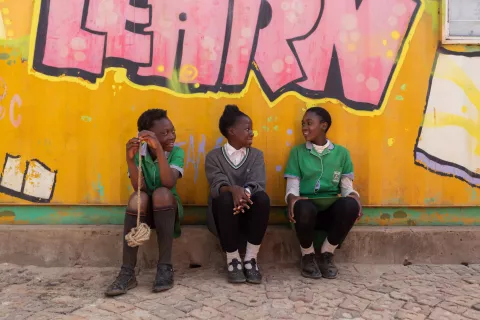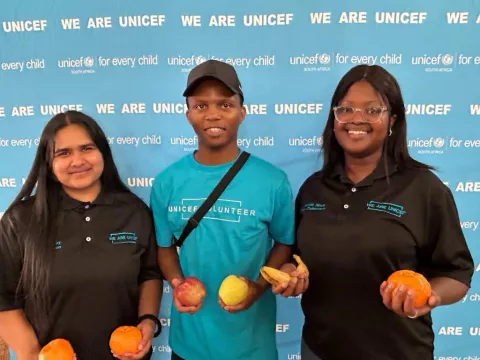Remarks by Ms. Christine Muhigana, UNICEF South Africa Representative at the Africa Vaccination Week Commemoration, Ehlanzeni, Mpumalanga
As prepared for delivery
Honorable Minister of Health, Dr Joe Phaala;
MEC for Health in Mpumalanga, Ms Sasekani Manzini
Ward councilors present,
Religious leaders and other community leaders present,
Officials from the National, Provincial & District Departments of Health,
Colleagues from UNICEF, my fellow UN Agencies and other partners
Ladies and Gentlemen,
I am pleased to deliver this message of support on behalf of the UNICEF South Africa at this official World Malaria Day and World Immunization Week commemoration.
UNICEF congratulates the Department of Health and the Ehlanzeni District for commemorating these two important health events which are a clear indication of the inclusion of immunization as a key strategy in child survival; integrated with the other critical child survival interventions; as well as the recognition of the importance of immunization along the life course.
Today is a chance to remind ourselves that immunization remains the most cost-effective public health intervention available. The theme for this year is, “Long Life for All: In pursuit of a long life well lived”. This is a fitting theme because, since the inception of the Expanded Program on Immunization, vaccines have, globally, been administered to more than 1.1 billion children to date, and this has more than halved the number of deaths by preventable diseases among children.
Vaccines for common diseases like measles and pneumonia are allowing more children – on our continent and around the world – to live longer and more fulfilling lives where they can go to school and play with friends.
Vaccines are one of the most impactful scientific innovations of all time, helping to protect generations of children against infections diseases throughout the course of their lives. A culmination of 200 years of research, worldwide collaboration and rigorous testing has led to the development of safe and effective vaccines for more than 25 diseases.
More recently, thanks to vaccines against diseases from COVID-19 to Ebola and cholera, we have the tools to keep our loved one safe from heath crises. COVID-19 has disrupted essential health services, including routine immunization, setting back progress by more than a decade. Unfortunately, millions of people are still missing out on the life-saving benefits of vaccines, making it urgent to catch up on those who have been missed.
I congratulate the Government of South Africa for funding the purchase of the vaccines that are used in this country. This self-financing of the childhood immunizations, the adolescent and maternal vaccines as well as more recently, the COVID 19 vaccines is a clear indicator of your commitment to leaving no-one behind with lifesaving vaccines.
This message of leaving no one behind is the key theme in the new global vision and strategy called the Immunization Agenda 2030 (IA2030) which envisions a world where everyone, everywhere, at every age, fully benefits from vaccines to improve health and well-being.
The DOH have consistently shown commitment to the childhood immunization program by not only the introduction of new vaccines but also providing immunization free of charge in over 3000 public facilities. The government of South Africa is also commended for the role it plays in the region and globally through the advocacy for increasing immunization coverage and the local production of vaccines.
We encourage the DOH to know and fully understand the reasons why some children and adults do not get vaccinated. Based on the reasons; to implement appropriate advocacy, communication and social mobilization initiatives.
Please be assured of continued UNICEF support to the DOH advance the maternal and child health agenda in South Africa specifically in improving national immunization programme and strengthening primary health care and community health system.
As we commence Africa Vaccination Week, we are reminded that we are closer to a world where future generations are protected from disease outbreaks and epidemics. The investments that we make today – in transformative technology and innovation in particular - can allow scientists to develop new vaccines more quickly and improve old ones, so that children are given the best and healthiest start in life.
These are exciting times, but also bring with them immense responsibility on our part to ensure sensitization of the policy makers, health care providers; relevant stakeholders and the communities to ensure that all are aware of the benefits of vaccination and take responsibility to enable achievement of this; so that no child in South Africa, in Africa and in the world ever suffers from vaccine preventable diseases again.
Today we are reminded that vaccines give everyone the opportunity to reach their full potential and provide hope for all of us to enjoy a healthy, more fulfilling life.
I thank you.
Media contacts
About UNICEF
UNICEF works in some of the world’s toughest places, to reach the world’s most disadvantaged children. Across more than 190 countries and territories, we work for every child, everywhere, to build a better world for everyone.
Follow UNICEF South Africa on Twitter, Facebook, Instagram, YouTube and LinkedIn




